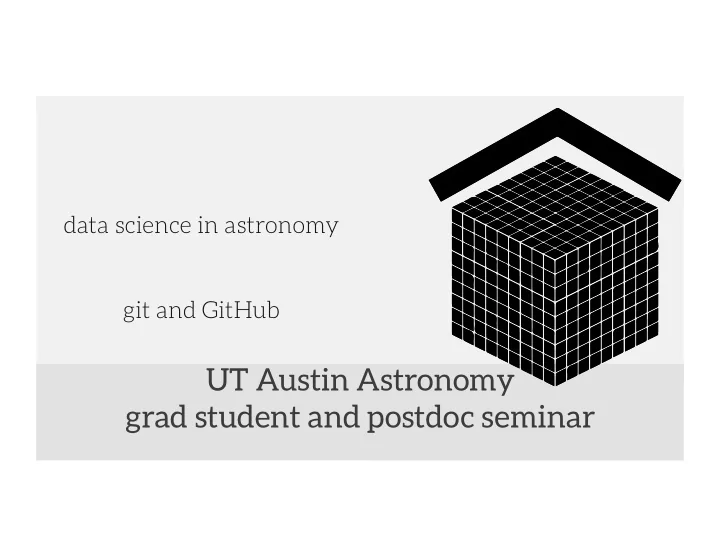

data science in astronomy git and GitHub UT Austin Astronomy grad student and postdoc seminar
I make diffraction gratings from single crystal silicon. I work on brown dwarfs, and have broad interests in star and planet formation. Lately, I’ve been building my skills in statistics, data mining, michael gully-santiago Graduate student at UTexas machine learning, and modern computing. Astronomy Aug 25, 2008 – May 2015 (projected) Advisor: Dan Jaffe why?
The volume of data in astronomy is growing.
Data rates in astronom Data r ates in astronomy and elsewhere y and elsewhere ! 100000 ! Facebook ear) ! ate (TB / year) 10000 ! LSST Data rate (TB / y 1000 ! NYSE The volume of data 100 ! SDSS 10 ! Data r 1 ! 2MASS HETDEX 0.1 ! gully’s data 0.01 ! 1995 ! 2000 ! 2005 ! 2010 ! 2015 ! 2020 ! 2025 ! sources: Year ear ! SDSS Bill Howe (UW) 2MASS http://spider.ipac.caltech.edu/staff/roc/2mass/archive/data.profile.v3.html My data set MGS HETDEX http://hetdex.org/pdfs/research/Hill1.pdf LSST Bill Howe (UW) NYSE http://marciaconner.com/blog/data-on-big-data/ Facebook http://gigaom.com/2012/08/22/facebook-is-collecting-your-data-500-terabytes-a-day/
The variety of data in astronomy is growing.
Here is a 94 second segment from a Coursera video. It’s from 0:30 to 2:14 of ‘eScience’ in Bill Howe’s Introduction to Data Science https://class.coursera.org/datasci-001/lecture/19
Key idea. The skills that will be useful for astronomy already are useful for data science.
Python MapReduce databases NoSQL /Hadoop Key idea. SQL The skills that will be useful for astronomy already are useful for data science. Automated Machine analysis Cloud R Learning Computing git & Visualizations GitHub
Key problem. The astronomy job market is sorta tough.
Key insight. Let’s build data science skills, because it will make our astronomy better, and better prepare us for NAPs*. It’s a win-win. *NAPs Non Academic Professions (C. Lindner talk from GSPS Jan. 17, 2014)
Key insight. Let’s build data science skills, because it will make our astronomy better, and better prepare us for NAPs*. It’s a win-win.
Key insight. Let’s build data science skills, because it will make our astronomy better, and better prepare us for NAPs*. It’s a win-win.
Key question. So how do we build these skills?
Astronomy courses, Colloquium, AstroPH lunch
Astronomy courses, Colloquium, AstroPH lunch
R o d b a R t a o b a i n n a s l o y n s ’ i s s c l a s s . Astronomy courses, Colloquium, AstroPH lunch
R o d b a R t a o b a i n n a s l o y n s ’ i s s c l a s s . Astronomy courses, Colloquium, AstroPH lunch
R o d b a . R t t h a o g b a u i n a n a t s l o f y l n e s ’ i S s s c l a s s . Astronomy courses, Colloquium, AstroPH lunch
R o d b a R t a o . k b a l i n a n t a s s l o y i n h s ’ T i s s c l a s s . Astronomy courses, Colloquium, AstroPH lunch
Our strategy. Let’s follow Brian Mulligan’s advice, and focus on just a few things.
Python MapReduce databases NoSQL /Hadoop Our strategy. SQL Let’s follow Brian Mulligan’s advice, and focus on just a few things. Automated Machine analysis Cloud R Learning Computing git & Visualizations GitHub
Python Our strategy. Let’s follow Brian Mulligan’s advice, and focus on just a few things. Machine Learning git & GitHub
Python These are the main topics of our data science in astronomy meetup. gigayear.weebly.com/data-science.html Machine mailing list Learning http://eepurl.com/LdArH
git & Here is an attempt at a live github demo. GitHub
git and GitHub demo pull request to astroML code base Visit astroML github page: https://github.com/astroML 1) Update the README.md file with this new text: Page 130: The denominator of the argument of the exponential of Eq. (4.11) should be sigma squared, not sigma, to better match Eq. (3.43) and lead to Eq. (4.13). 2) git status, git add, git commit, git push 3) Perform a pull request on GitHub
gully@astro.as.utexas.edu | Thank you. astronomer and engineer This presentation is available for download on speakerdeck attribution to: Pierre TORET, from The Noun Project Sá Ferreir a - Purple Matter, from The Noun Project Open questions for discussion Is this all worth it? Will this put more papers in the ApJ? When is the best time to invest? Is it still useful if I’m not collaborating? Are we getting what we want from the Dept.? How do we build synergies within the Dept.? How to build momentum, overcome inertia
extras
Global Resources codeschool.com is a great way to quickly learn git try.github.io is a great way to try the basics of git astroml.org contains Astronomy specific machine learning code coursera.org/course/datasci has free online videos
aas.org/posts/story/2014/01/astrophysics-code-sharing-ii-sequel Making Your Work More Valuable by Giving It Away Benjamin Weiner (University of Arizona) NSF Policies on Software and Data Sharing Daniel Katz (National Science Foundation) The Astropy Project’s Self-Herding Cats Development Model Erik Tollerud (Yale University) Costs and Benefits of Developing Out in the Open David W. Hogg (New York University)
Local Resources UT Austin data science in astronomy meetup- times vary Next week’s grad student town hall- (& proposal to astro Faculty) Friday, Feb 7 at 1pm in the classroom UT Austin Astronomy GitHub Organization: OttoStruve
The data science in astronomy meetup- times vary Next week’s grad student town hall Friday, Feb 7 at 1pm in the classroom UT Austin Astronomy GitHub Organization: OttoStruve
Recommend
More recommend